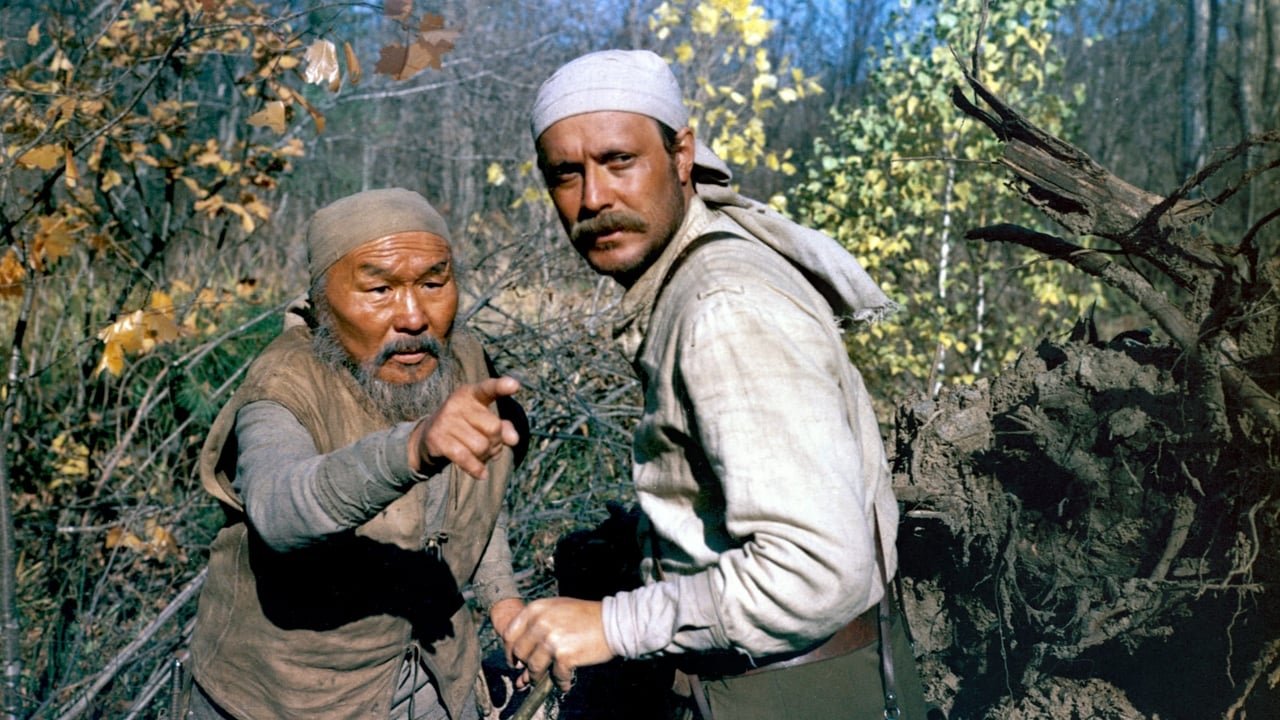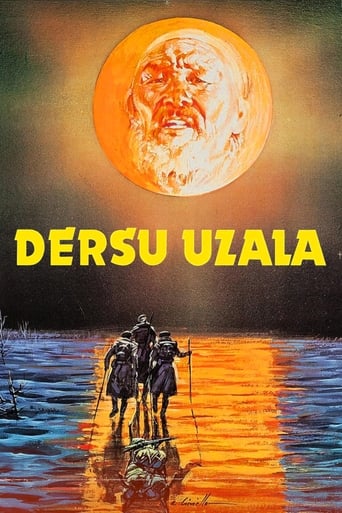

When the movie ends and your breath still can't calm down and you want to share what you've just seen with the closest ones... it deserves 10.Definitely not the perfect action/adventure. But I don't suppose it was meant to be such."People", he repeated all the time - "people" were everywhere. People were the soldiers, people were the trees, the fire, the wind, the beasts in the wood...It amazed me enormously the idea of a man so well living with the nature (not "in"), so respecting it that it has been turned into a part of him.A great example of how surviving does not make you necessarily mean and angry man. ...But a truly loving one.
... View MoreOne important issue was yet not touched in previous reviews - it's the Vladimir Arseniev books, that became Kurosawa's Dersu Uzala story. Not just memoirs or journal, but books that were written by Vladimir Arseniev based on his experience as an explorer of Sikchote Alin. These books were and still remain popular and well known in Russia. The books are based on memoirs and journals of Arseniev, but he made a good work to create a literature of them. And this he did exactly by focusing on friendship between him and Dersu (which indeed took place), and on unique character of the latter. And a great part of the books is a beautiful depiction of nature. The film "Dersu Usala" follows these initial focuses and ideas to make perfect visualization.So, please also pay some tribute to the soul and talent of Vladimir Arseniev, whose work is a masterpiece in itself, even if there were no any films based on it.There is a wiki page about this writer and some of his books were translated and can be found by non-Russian-speaking readers.
... View MoreDersu Uzala is not just the quintessence of pristine cinema or a landmark in art cinema, but is also a living proof that brilliance can be achieved with absolute simplicity. Storytelling is undoubtedly one of the most potent tools known to man: from the Illiad and Odyssey of Homer to the tales of Jataka, to the 1001 nights of Arabia, to the tales of Panchatantra, to the plays of Shakespeare, man has always found ways to amuse himself by spinning the yarn of his imagination. These tales, though picturesque, fantastic and resplendent, mostly overlooked the potency of austerity vis-à-vis grandeur as an element of revelation powerful enough to transcend the effects of all other affects know to man. Only a handful of storytellers like Akira Kurosawa and Satyajit Ray have shown the grit and perspicacity to use simplicity as the weapon to incite and hence portray the deepest of the human emotions on the celluloid. Kurosawa demonstrated the might of simplicity as an element that can pack a punch for the first time in Ikiru and followed it up with an unending list of pristine cinematic masterpieces including Seven Samurai. But, even Kurosawa's greatest critic would not find it hard to concede that cinema does not get any purer than Dersu Uzala. Dersu Uzala is a poignant tale of human bonding of trust, friendship and adoration between two contrasting individuals: a nomadic hunter and an army explorer. Captain Arseniev and his troops are on a topographic expedition and while camping during a night, they come across Dersu, who happens to be an aboriginal (Goldi) tribesman. Being fully aware of the handicap of being in a remote and tricky territory and of the indispensability of having an indigene in the ranks, Arseniev asks Dersu to be their guide. Dersu being humbled by Arseniev's courtesy obliges his offer almost immediately. We soon witness a great sense of camaraderie developing between the two of them as Dersu rises in status from being a comrade to a stalwart and a friend in the eyes of the captain. The long years of experience had equipped Dersu with a great sense of intuition and psychic-like abilities to anticipate change and danger. Dersu uses his skills to good effect as he maneuvers captain and his troops through the harsh Siberian terrain, sheltering and guarding them from the cruelties and wilderness of the Tundra. Behind the façade of a rugged hunter, we see a man of profound intellect and deep compassion in Dersu which is most conspicuous in his respect for the old Chinese and his selflessness in rescuing Captain Arseniev and one of his men. After the expedition is over, Arseniev embraces Dersu and bids him farewell as Dersu returns to the wilderness. Few years later, when Arseniev returns to Siberia on another expedition, he once again encounters Dersu, who again proves to be handy, only this time round he appears to be aging really fast as time, which can be a great healer as well as a great leveler, had begun to take a toll on the Goldi. His eyesight deteriorates under the superstitious effect of a self-imposed curse after having killed a Siberian tiger, which the Goldis worship, in an act of self-defence. Arseniev, in his pitied adoration for Dersu, takes him to the city to live with his family. Arseniev's son gets greatly attached to Dersu and his story-telling abilities, but Dersu finds it difficult to adapt to the relatively restricted and significantly tamed urban life and soon realizes that his life has been reduced to that of a captive. He implores the captain to let him return to the wilderness of the woods. With great reluctance, Arseniev grants him the permission to leave, but not before presenting his savior with a brand new rifle as a parting gift and a souvenir. Few months later, Arseniev receives a letter informing him that a dead body of a Goldi has been found with no identification on it barring Arseniev's visiting card. As Arseniev pays a visit to the place of burial, he identifies the dead Goldi to be none other than Dersu Uzala. The investigating officer speculates the Goldi's brand new rifle might have lured someone into killing him.Dersu Uzala is not just a movie, but is an experience of a lifetime. Dersu Uzala is the only movie that Akira Kurosawa shot in a language other than Japanese and he proved it once and for all that cinema at its most pristine, knows no bounds or barriers. Kurosawa uses his auteurist mastery to bring the memoirs of Russian explorer, Vladimir Arsenyev to life as he inexplicably metamorphoses cinema to new levels of poignancy and pristineness. The cinematography is breathtakingly picturesque and it evokes a sense of melancholy that makes the majestic Siberian wilderness appear hypnotic and at times, surreal. The panoramic shot of Dersu and Arseniev looking at the horizon caparisoned with the juxtaposition of the setting sun and the rising moon is also indicative of their respective lives: Dersu is long past his prime and there is no hope for revival, but Arsieniev's is still in his prime and has a promising career ahead. Dersu Uzala is strongly suggestive of the sole consistency in human life: change. It also demonstrates the might of nature as an unforgiving force, strong enough to humble even the most savage of the creatures. Dersu Uzala can also be termed as an allegorical account of the environmental imbalance that unrestrained human intervention is causing. Dersu Uzala, besides being one of Kurosawa's greatest masterpieces is one of those rare cinematic gems which can be relished again and again, each time with a completely different perspective. It's a must watch for everyone who loves and understands cinema. 10/10For more on cinema visit: http://www.apotpourriofvestiges.com/
... View MoreYes, it sounds corny, but "Dersu Uzala" is (to me) really a love story as well as one of friendship; I cannot think of a more complete, platonic love between two friends. Just think of the scene in which Dersu and the "Capitan" spy one another through the dense woods, reunited after years, and rush towards one another, shouting each other's names. It was a giddy moment, and tearful.As much as these two very different men bond, they remain different. Though Arseniev is changed dramatically by Dersu's influence (as are his men, to some extent), Dersu remains pretty much the same. He is organic, part of his wild environment, as much as the trees, rivers or animals. His inner thoughts, though partly understood by Arseniev, remain largely a mystery to the sensitive Captain. In some ways, I think the latter likes this better than knowing all about Dersu, as if he ever could.Much has been made of the stunning scenery and Kurosawa's "lingering" way of filming it, which was so perfect. There were also very intense scenes, in which the two men were pitted against the very active forces of nature, such as a snowstorm and a raging river, not to mention the mysterious and symbolic tiger that stalks them. Add to all that the humor that bubbles up regularly, from both men, usually in surprise at the odd way the other does things, and you have a very dynamic film, despite its apparent tranquility. One of my favorite scenes is the Christmas encampment, in which the men have decorated a tree with various things like tin cans, forks and even chunks of ice. It signifies the turning point, especially for Dersu. At first it is comical, but this is also when he becomes obsessed with the tiger's "ghost".I can't imagine anyone finding the pace of this film "slow"; it is just right. Any faster and we would have "The Edge" instead (which makes me wonder if some of that was inspired by "Dersu Uzala"). Not that the latter film was bad--I actually like it quiet a bit--but it is no "Dersu Uzala"; few films ARE.-SPOILER- I agree with the person who wrote that Dersu's death seems appropriate; for, once his sight was almost gone, how could he live in his natural environment? And he could not handle modern, city life. It was the only way out for him, though quite sad. To me, it symbolized the death of the old hunter-gatherer culture across the world, and the "triumph" of industrialization. Even Arseniev, despite his respect for Dersu, makes no attempt to change his modern lifestyle to go live in the wild. He is content to be part of the 20th Century.The fact that the two men bond so deeply WITHOUT becoming like one another or trying to imitate each other to any great extent, is what makes this a love story, I think, and a tragic one. They know that they can never live in one another's worlds for long, try as they may.Some have compared Dersu Uzala to Yoda, but I think the old man would laugh at this. Unlike Yoda, he did not seem to see himself as particularly special, which was part of his charm. He reminds me more of Jeremiah Johnson or later, Lt. Dunbar, or better yet, Kicking Bird in "Dances with Wolves". He craves simplicity and merely living off the land, not wisdom, nor even enlightenment, as Westerners see it. Perhaps that's because he already has it.
... View More